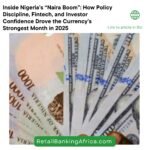In a continued show of monetary restraint, the Central Bank of Nigeria (CBN) has retained the Monetary Policy Rate (MPR) at 27.5%, following the conclusion of its 301st Monetary Policy Committee (MPC) meeting held on Tuesday, July 22, 2025. This marks the seventh consecutive time the rate has been held steady, despite mounting public pressure for interest rate relief and slowing economic growth.
According to CBN Governor, Dr. Olayemi Cardoso, the decision to maintain the current rate was unanimous among all 12 MPC members. “The move is aimed at sustaining the disinflationary trend and containing further price pressure,” he said during the post-meeting press briefing. The inflation rate, while down slightly, still stood at 27.2% year-on-year in June 2025, significantly above the CBN’s 6–9% comfort range.
Key policy decisions announced include:
• Retention of the MPR at 27.5%
• Maintenance of the asymmetric corridor at +500/-100 basis points
• Continuation of the Cash Reserve Ratio (CRR) at 50% for commercial banks and 16% for merchant banks
• Preservation of the Liquidity Ratio at 30%
These measures are designed to stabilize the macroeconomic environment while providing the CBN room to assess the ongoing impact of its tight monetary policies.
Despite these efforts, consumer sentiment tells a different story. A recent CBN survey revealed that 62.4% of Nigerians prefer a reduction in interest rates, citing high borrowing costs and limited access to credit as significant barriers to personal and business growth. Interestingly, 45% of respondents favored interest rate cuts to stimulate spending and investment, while 40.3% supported further hikes to combat inflation.
The retention of high rates signals the CBN’s commitment to curbing inflation and maintaining foreign exchange stability. Still, analysts are split—some praise the CBN’s resolve to defend the naira, while others warn that persistently high rates risk choking off economic momentum and worsening unemployment.
With Nigerian banks having raised over N13 trillion in fresh equity as part of ongoing recapitalisation, the financial system remains well-capitalized. Yet, as inflation continues to erode purchasing power, all eyes remain on the CBN’s next move—will stability give way to stimulus?









